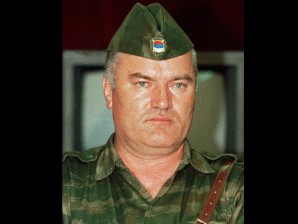
Bosnian Serb army commander General Ratko Mladic is seen in Belgrade in this 1992 file photo. Mladic has been arrested, ending a 16-year manhunt for the general accused of masterminding Europe's worst massacre since World War II. AP
BELGRADE—Serbia announced the arrest of former Bosnian Serb military chief Ratko Mladic on Thursday, ending a 16-year manhunt for the general accused of masterminding Europe’s worst massacre since World War II.
President Boris Tadic confirmed reports that the 69-year-old had been detained by Serbian security forces, saying the capture would bolster Serbia’s “moral credibility in the world”.
“Today, early in the morning, we arrested Ratko Mladic,” the president told a press conference in Belgrade.
“The extradition process is underway,” he added, referring to the process to transfer Mladic to the International Criminal Tribunal for the former Yugoslavia (ICTY), a UN tribunal based in The Hague.
“Today we close one chapter, a chapter in our history, which brings us … one step closer to full reconciliation in the region,” Tadic added.
Mladic, the most wanted fugitive from the ICTY, faces charges of genocide, crimes against humanity and war crimes for his role in the Srebrenica massacre and the bloody siege of Sarajevo during the 1992-95 conflict.
Tadic would not say how and where Mladic was arrested other than to confirm he was captured on Serbian soil.
But Serbian security sources told Agence France-Presse that three special units swooped on a house in Lazarevo around 80 kilometers (50 miles) southwest of Belgrade and close to the Romanian border early Thursday.
The house was owned by a relative of Mladic and had been under surveillance for the past two weeks, one of the sources added.
It is not known where Mladic is now but according to the Serbian procedures he is due to appear before the special war crimes court to get the extradition process started. It could take as much as a week before he is extradited.
His arrest follows heavy pressure from the European Union which has made clear that Serbia’s failure to capture Mladic was a major obstacle to its hopes of joining the 27-nation bloc.
In his press conference, Tadic stressed that the arrest had come about as “a result of the full cooperation with the Hague war time tribunal.”
“I am convinced that this way we have opened the door to candidacy status and negotiations and finally to EU membership,” he said.
Reacting to the arrest, EU foreign policy chief Catherine Ashton said Mladic must now be transferred to The Hague “without delay.”
“The arrest of Ratko Mladic is a very positive development for the European Union, for Serbia’s neighbors, but most of all for the rule of law in Serbia itself,” Ashton’s spokesman said.
A senior United States official also said that Washington was “delighted” by the arrest.
Earlier in the day, it had emerged that the special prosecutor for the ICTY had again accused Belgrade in a new report of not doing enough to capture Mladic and the former Croatian Serb leader Goran Hadzic.
The report by the prosecutor, Serge Brammertz, was seen as crucial to Serbia’s hopes of being made an official EU candidate nation by the end of this year.
In a statement after the arrest was announced, Brammertz said the arrest of Mladic meant Serbia had “fulfilled one of its international obligations”.
The Bosnian Serb wartime political leader Radovan Karadzic, Mladic’s mentor, was captured in July 2008 and he is currently on trial in The Hague.
Mladic’s capture ends a tortuous political and judicial saga since he was first indicted by the ICTY for his leadership role in the 1992-1995 Bosnian war as the former Yugoslavia fell apart.
The indictment against him specifically cites the establishment of camps and detention centers for Bosnian Muslims as part of a campaign of ethnic cleansing, as well as the July 1995 Srebrenica massacre and the 44-month siege of Sarajevo.
At Srebrenica, which had been under nominal UN protection, 8,000 Muslim men and boys were rounded up and massacred in Europe’s worst atrocity since World War II.
“After 16 years of waiting … this is a relief,” Hajra Catic, head of the Srebrenica Women association, told AFP after the arrest.
“For us, this is really very important,” added Catic whose son and husband were killed in the massacre.
The UN indictment says Mladic was the operational mastermind behind the slaughter, the only episode during the bloody Bosnian war that was ruled a genocide by the court.
Mladic was able to evade capture for almost 16 years since his indictment in 1995, notably thanks to a years-long lack of political will in Belgrade and his status to many Serbs as a war hero.
He lived almost openly in Belgrade until 2000 when former Yugoslav president Slobodan Milosevic, was ousted from office. The ouster of his one-time mentor robbed Mladic of his untouchable status.
Even afterwards, though, Mladic hid under military protection, authorities in Serbia have admitted.